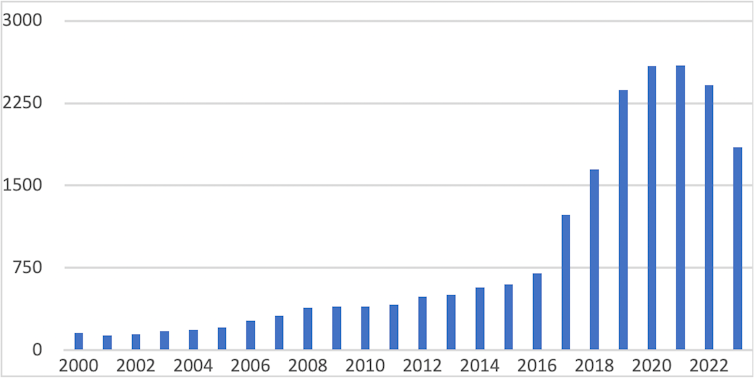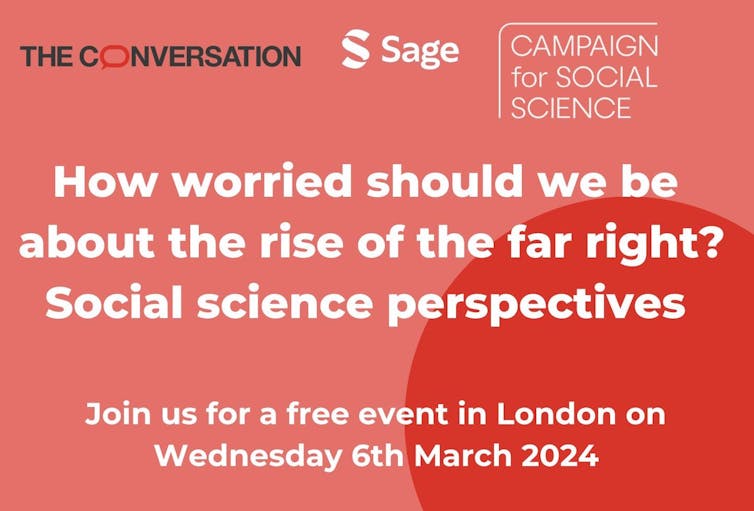microstock3D/Shutterstock
From the storming of the US Capitol on the January 6 2021, to the same rebellion in Brazil in 2023, far-right politicians are infringing on democratic beliefs internationally. If we’re critical about assembly the problem they pose, we should cease treating them as professional, democratic actors and as an alternative see them because the risk they are surely.
A really huge a part of this effort can be fairly a easy step. We should cease referring to far-right politics as “populist”.
In current years, critical analysis on populism has reached considerably of a consensus which makes it clear that it’s secondary, at finest, in defining any form of politics. The two major faculties of thought broadly disagree on whether or not populism is a skinny ideology which includes a moralistic factor (by pitting a “pure” individuals in opposition to “corrupt” elite) or whether or not it’s merely a discourse that constructs a individuals as being in opposition to an elite, with none additional specificity connected to these two teams.
Crucially, although, each agree that the populist factor of any given motion comes second to politics and beliefs. Parties of the left and proper could each use populist rhetoric, however this tells us little about how they really govern.
But populism has however turn out to be a buzzword. Countless lecturers have jumped on the bandwagon in quest of funding and citations, typically failing to do due diligence to the literature on the subject.
Number of articles containing the phrases ‘populist’, ‘populism’ or ‘populists’ on Web of Science

A surge in tutorial papers referring to populism.
Aurelien Mondon/Alex Yates, CC BY
Beyond poor tutorial observe, the careless use of the phrase has additionally had a deleterious influence on wider public discourse. These 4 penalties ought to hopefully persuade you to cease utilizing the phrase “populist” to explain somebody who is definitely only a rightwing extremist.
1. It masks the risk posed by the far proper
It shouldn’t come as a shock that many far-right politicians, from France’s Jean-Marie Le Pen, to Italy’s Matteo Salvini, have embraced the time period “populism”. Even when it’s utilized by their opponents as an insult, far-right politicians favor the time period to extra correct, but additionally extra stigmatising phrases, resembling “extremist” or “racist”.
This might be witnessed, for instance, within the Guardian’s 2019 six-month-long sequence on “the brand new populism”. More typically than not, the phrase populism was used on this sequence to explain way more sinister politics than the easy opposition between the elite and the individuals. Political personalities resembling Steve Bannon are much better described as far or excessive proper. These phrases will not be solely extra exact, however make the risk they pose far clearer than the murky “populism”.
2. It exaggerates the power of the far proper
When we use the time period “populist”, we frequently create a semantic hyperlink between the phrase and “the individuals”. So after we permit the far proper to be described as populist, we’re incorrectly implying that they’re tapping into what the individuals need or that they converse for the “silent majority” – one thing Nigel Farage and others love to assert.

Far-right events and politicians are mounting election campaigns all around the world in 2024. Join us in London at 6pm on March 6 for a salon fashion dialogue with specialists on how severely we should always take the risk, what these events imply for our democracies – and what motion we will take. Register to your place at this free public session right here. There will probably be meals, drinks and, better of all, the chance to attach with attention-grabbing individuals.
The fantasy is additional entrenched by the notion that the rise of “populism” is the results of selections made by individuals on the backside of the socio-economic ladder – whether or not they’re outlined because the “white working class”, the “left behind” or the “losers of globalisation”. This ignores evaluation which reveals that a lot of the assist for reactionary politics comes predominantly from prosperous teams.
Being allowed to assert to talk on behalf of the unvoiced is especially helpful at a time of widespread mistrust in mainstream politics, so we shouldn’t be shocked that far-right politicians prefer to be referred to as populists. It permits them to falsely posit themselves as the choice to the established order.
3. It legitimises far-right politics
By being erroneously tied to “the individuals” by way of the phrase “populism”, far-right calls for are mistaken for democratic calls for. It is subsequently now frequent to see mainstream events absorbing the politics of the far proper on the flawed assumption that these concepts are “what the individuals need”.
The rights of minoritised communities resembling migrants, asylum seekers, racialised individuals, LGBTQ+ communities, ladies and/or disabled individuals have all been beneath varied ranges of risk by mainstream elite actors, whether or not by means of coverage, political campaigning or information protection. Often, the individuals threatening these rights profit from the pretence that they’re merely responding to public opinion. Supposedly “centre-right” governments are, subsequently, given carte blanche to undertake draconian immigration insurance policies. After all, it’s within the identify of “the individuals”.
4. It blocks democratic progress by distracting us
Populist hype is usually accompanied by an increase of anti-populist discourse, which portrays “populism” as an existential risk to liberal democracy. Thinly hid behind this pejorative use of the time period “populism” is at finest a mistrust, if not outright antipathy, in direction of “the individuals”.
By blaming “the individuals” for the issues in our democracies, elites are absolved from having to interrogate their very own function in facilitating the disaster. They can even use the very actual risk posed by the far proper to justify the necessity to assist the established order by warning “we’re unhealthy – however they’re worse”.
What is to be performed?
Reducing the far proper to a “populist” risk permits the mainstream off the hook. When combating the far proper, we have to be sincere concerning the selections which have led us to this reactionary second. If the mainstream doesn’t take accountability, it has no likelihood of defeating the monster that it has helped to create. This applies notably to those that have a privileged entry to shaping public discourse such because the media, politicians and lecturers to a lesser extent.
Read extra:
Look to the mainstream to elucidate the rise of the far proper
The first step on this journey is utilizing phrases accurately. Calling the far proper “populist” retains us in our inertia. To activate the suitable sense of urgency wanted to defeat these traits, we have to be sincere concerning the form of politics that we see in entrance of us. If the far proper proudly wears the badge of “populism”, we should ask the way it helps them. They comprehend it grants them legitimacy. Why, then, ought to we play into the palms of extremists whose loathing of democracy has been repeatedly demonstrated?
![]()
Alex Yates receives funding from the Economic and Social Research Council South West Doctoral Training Partnership.
Aurelien Mondon doesn’t work for, seek the advice of, personal shares in or obtain funding from any firm or organisation that may profit from this text, and has disclosed no related affiliations past their tutorial appointment.
